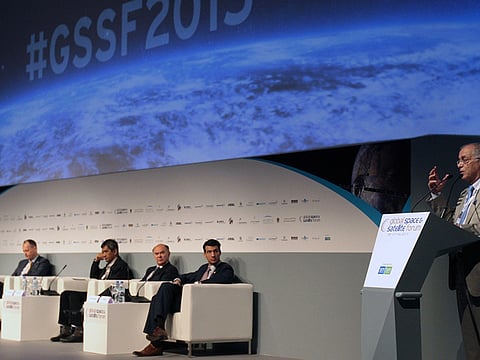Dubai and UK satellites to work together
One-year project expected to start on June 1

Abu Dhabi: Satellites of Dubai and the UK will work together soon to support many Dubai projects, including Smart Government, UK officials told Gulf News on Tuesday.
DubaiSat, the satellite launched by Dubai, and Deimos, the satellite of Deimos Space UK Ltd, will work together to feed information to the [Dubai] government, Philip Davies, managing director of Deimos, said in an interview.
Both satellites can take high-resolution images of Dubai periodically to monitor the changes in buildings and roads [and new constructions], agricultural areas, vegetation, water in reservoirs, etc, he said.
“For example, to build a new road, you have to update the digital map of the country. [This project will help such updates],” Davies said.
The satellite data will be fed to the government periodically. That information will help the government in its projects, including Smart Government, the executive said.
The one-year project is expected to start on June 1. An agreement on the project is expected to be signed in Abu Dhabi on Wednesday between Deimos and the Mohammad Bin Rashid Space Centre (MBRSC), Davies said. MBRSC was not immediately available for comment.
Dr David Parker, Chief Executive of UK Space Agency, told Gulf News that the joint project is under the umbrella of cooperation between UK Space Agency and the UAE Space Agency. “We expect more such cooperation in future,” he said.
They spoke to Gulf News on the sidelines of the first day of the fifth Global Space and Satellite Forum (GSSF 2015) hosted by the UAE Space Agency in Abu Dhabi on Tuesday.
Dr Mohammad Al Ahbabi, Director-General of UAE Space Agency, said in his opening remarks that when the UAE started building satellites a few years ago, their range was limited to the UAE and the Gulf region but now the UAE’s satellites cover even America.
He said one of the most exciting parts of industry [in general] is the ideas, initially designed for use in space, that have prompted another technology revolution on the ground. Global positioning system (GPS), the cell phone, and new more powerful radios are examples, Al Ahbabi said.
“We have space research to thank for modern biomedical techniques, imaging technology, digital systems, robotics, information and communication technology, meteorological applications, environmental monitoring, remote sensing imagery, and more. We look forward to the contributions of Emirati scientists will make to modern technology.”
A US scientist said the UAE’s Mars Mission [the Hope Probe] will attract excitement across the globe. The National Aeronautics and Space Administration (Nasa of the US) got more than 1.6 billion hits from across the globe on its website during its Mars mission and the UAE can also expect the same excitement, Dr Charles Elachi, Director of Jet Propulsion Laboratory at Nasa, said.
Fifty million people in the US followed the Nasa’s Curiosity Rover that landed on Mars as space exploration always creates a lot of excitement, he said. Elachi said when he visited Abu Dhabi four years ago, he never imagined that the UAE would take up an ambitious project like the Hope Probe. Speaking to Gulf News, he said: “Space exploration always excites the youth and the UAE’s Mars Mission will inspire the youngsters in the Arab world and developing countries.
“Inspiring means not necessarily to be scientists and technocrats but to innovate in their areas of interest like business and all other fields.”
Sign up for the Daily Briefing
Get the latest news and updates straight to your inbox



